#what do you disagree with?
Text
How I like my fanfics
Heterosexual: ❌
Gay as hell: ✅
Both parts being a horny mess who love each other for their looks and hotness: ❌
Romance, fluff: ✅❤️✅
A little angst: ✅
A lot of angst: ✅
A little smut: ✅
A lot of smut: ❌
Consent: ✅✅✅✅✅✅✅✅✅✅
Poetic descriptions, sappy analogues, romance and fluff all over: ❤️
Them confessing their undying love with a kiss: ❌
Them confessing their undying love in a cute, romantic way, THEN asking for consent, out loud or by checking body language, THEN a cute and fluffy lil kiss: ✅❤️
Use of words such as d!ck and c0ck: ❌❌❌❌❌
Detailed descriptions of sex: ❌❌❌❌❌
Them having sex: ❌
Them making love: ✅❤️❤️
Descriptions of their feelings in the moment and their thoughts and cute lil moments, rather than descriptions of they’re actions and the sex itself: ❤️❤️❤️
Slowburn: ✅
Enemies to lovers: ✅
Side ships (queer af ofc): ✅
Friendship OTP’s involved: ✅
THE LONGEST FIC IMAGINABLE: ❌
A really long fic: ✅
#do you agree or disagree?#what do you agree with?#what do you disagree with?#should I do one with fics about specific ships?#which ships should I write about in that case?
0 notes
Text
im not american but some of you guys are just fucking stupid ong what do you MEAN youre not gna vote because you disagree with like one part of what youre voting for. like okay me when im fucking thick
#you guys are being FUCKING STUPUD#vote i actually swear to fucking god dont be THICK#“genocide joe” yeah i agree hes supporting a genocide thats a face#fact*#but hes three billion times better than trump in EVERY OTHER WAY???????#USE YOUR COMMON FUCKING SENSE#genuinely its not hard#“dont vote guys both parties are bad” ARE YOU STUUUUUUPID ARE YOU FUCKING STUPID IM GONNA BEAT YOU UP#would you rather a) have rights + disagree with one policy or b) be imprisoned for basically just being alive + disagree with every policy#YOURE FUCKING STUPID#like im not gonna force you to vote for someone or to vote at all but Jesus fucking christ#mate do you want rights or not#do you want the ENTIRE PLANET to suffer because of something you think gives you moral superiority (hint: IT DOESNT)#fucking vote#blah blah!#not 75 stuff#smart posting wow#should i tag#you know what i fucking am because youre STUPID#i dont CARE if you disagree with some of their morals. i agree the ones that you dislike are TERRIBLE but dear fucking lord#idk how to tag wait#kamala harris#joe biden#idk man#just fucking vote#us politics#election 2024#us elections#american politics
1K notes
·
View notes
Text
Prompt 331
Demon twins? Demon twins.
Damian? Good at the assassin side of things, at least for a four year old, but Danyal? He’s okay, but he’s far better at things like poisons and bookkeeping. Which is honestly? Okay. They’re the League of Shadows, and sure a majority of the members are assassins, but it’s definitely not all there are. So? Danyal starts getting medical training.
Not to say that either of the boys don’t know their fair share of violence and healing- it’s just better to let them play to their strengths. One doesn’t keep a league over centuries if they just have one type of warrior, or even just warriors. A variety is needed.
So one gets trained more towards the business side of things. Damian may be better at wielding the weapons and killing- even if neither have had their first kill quite yet- but Danyal shows far more proficiency at acting, at masking who he is and gathering information.
Damian, when he’s first sent to their Father, doesn’t mention his twin. Not because he’s jealous or hates him or anything like that. You just don’t talk about someone in an undercover mission in the League, and it’s not something he realizes isn’t a rule everywhere.
Needless to say, the Bats have more than a mild freakout the first time Damian mentions a twin who will be coming to the manor now that his mission is over.
#DCxDP#DPxDC#Prompts#Demon Twins#Danny was undercover in Amity not for the ectoplasm but for the weapons the Fentons made#Mostly in concern about what it could do to the environment & the earth#The League of Assassins are the most violent ‘I Speak For The Trees’ not-so-hippie group ever#Why yes Danny & Damian have talked but it’s more like sending messages of “Are you alright” “Yes are you” “Yes”#Danny is better at masking than Damian & better at getting information that isn’t through torture#Yes he chooses to be an annoying punny lil shit on purpose for his own amusement#Danny: Brother I have acquired a ghost dog- we must shut down the company who put down the puppy#Sam & Tucker: Dude I think you were in a cult#Danny: Agree to disagree to two people who have in fact started cults themselves#Yes he's been undercover for a couple years & yes he uses the fact he knows medical care to get further information#People don't like silence and will chatter while you bandage their ecto burns#Danny sends Dani to the League instead of around the world#Talia is delighted to have a daughter#Vlad does not live long after that & becomes a full ghost
1K notes
·
View notes
Text
Very interesting to me that a certain subset of the BES fandom's favourite iterations of Mizu and Akemi are seemingly rooted in the facades they have projected towards the world, and are not accurate representations of their true selves.
And I see this is especially the case with Mizu, where fanon likes to paint her as this dominant, hyper-masculine, smirking Cool GuyTM who's going to give you her strap. And this idea of Mizu is often based on the image of her wearing her glasses, and optionally, with her cloak and big, wide-brimmed kasa.
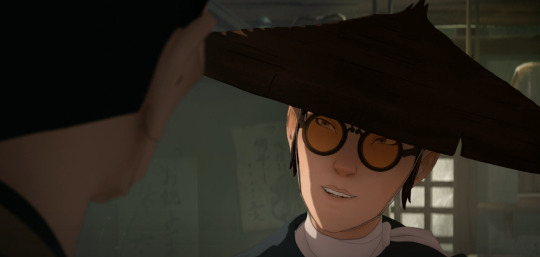

And what's interesting about this, to me, is that fanon is seemingly falling for her deliberate disguise. Because the glasses (with the optional combination of cloak and hat) represent Mizu's suppression of her true self. She is playing a role.

Take this scene of Mizu in the brothel in Episode 4 for example. Here, not only is Mizu wearing her glasses to symbolise the mask she is wearing, but she is purposely acting like some suave and cocky gentleman, intimidating, calm, in control. Her voice is even deeper than usual, like what we hear in her first scene while facing off with Hachiman the Flesh-Trader in Episode 1.
This act that Mizu puts on is an embodiment of masculine showboating, which is highly effective against weak and insecure men like Hachi, but also against women like those who tried to seduce her at the Shindo House.
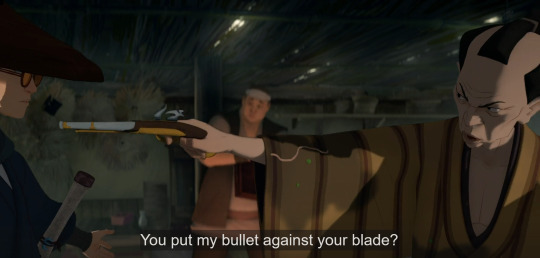

And that brings me to how Mizu's mask is actually a direct parallel to Akemi's mask in this very same scene.
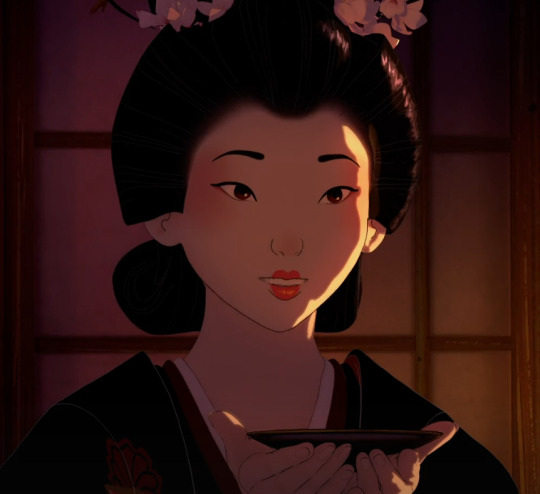
Here, Akemi is also putting up an act, playing up her naivety and demure girlishness, using her high-pitched lilted voice, complimenting Mizu and trying to make small talk, all so she can seduce and lure Mizu in to drink the drugged cup of sake.
So what I find so interesting and funny about this scene, characters within it, and the subsequent fandom interpretations of both, is that everyone seems to literally be falling for the mask that Mizu and Akemi are putting up to conceal their identities, guard themselves from the world, and get what they want.
It's also a little frustrating because the fanon seems to twist what actually makes Mizu and Akemi's dynamic so interesting by flattening it completely. Because both here and throughout the story, Mizu and Akemi's entire relationship and treatment of each other is solely built off of masks, assumptions, and misconceptions.
Akemi believes Mizu is a selfish, cocky male samurai who destroyed her ex-fiance's career and life, and who abandoned her to let her get dragged away by her father's guards and forcibly married off to a man she didn't know. on the other hand, Mizu believes Akemi is bratty, naive princess who constantly needs saving and who can't make her own decisions.
These misconceptions are even evident in the framing of their first impressions of each other, both of which unfold in these slow-motion POV shots.
Mizu's first impression of Akemi is that of a beautiful, untouchable princess in a cage. Swirling string music in the background.
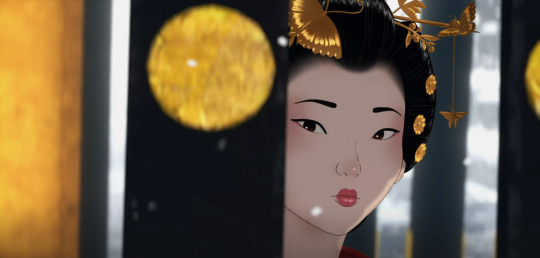
Akemi's first impression of Mizu is of a mysterious, stoic "demon" samurai who stole her fiance's scarf. Tense music and the sound of ocean waves in the background.

And then, going back to that scene of them together in Episode 4, both Mizu and Akemi continue to fool each other and hold these assumptions of each other, and they both feed into it, as both are purposely acting within the suppressive roles society binds them to in order to achieve their goals within the means they are allowed (Akemi playing the part of a subservient woman; Mizu playing the part of a dominant man).
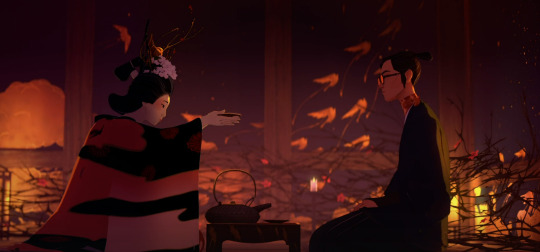
But then, for once in both their lives, neither of their usual tactics work.
Akemi is trying to use flattery and seduction on Mizu, but Mizu sees right through it, knowing that Akemi is just trying to manipulate and harm her. Rather than give in to Akemi's tactics, Mizu plays with Akemi's emotions by alluding to Taigen's death, before pinning her down, and then when she starts crying, Mizu just rolls her eyes and tells her to shut up.
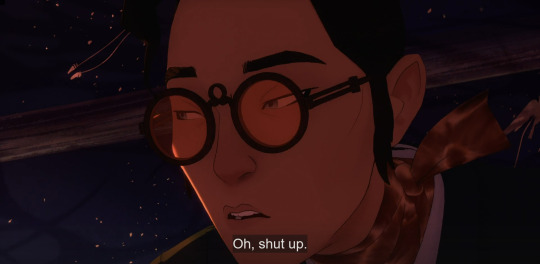
On the opposite end, when Mizu tries to use brute force and intimidation, Akemi also sees right through it, not falling for it, and instead says this:
"Under your mask, you're not the killer you pretend to be."
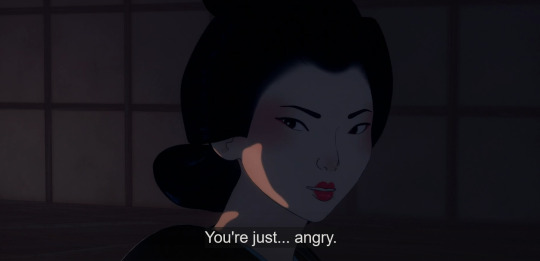
Nonetheless, despite the fact that they see a little bit through each other's masks, they both still hold their presumptions of each other until the very end of the season, with Akemi seeing Mizu as an obnoxious samurai swooping in to save the day, and Mizu seeing Akemi as a damsel in distress.
And what I find a bit irksome is that the fandom also resorts to flattening them to these tropes as well.
Because Mizu is not some cool, smooth-talking samurai with a big dick sword as Akemi (and the fandom) might believe. All of that is the facade she puts up and nothing more. In reality, Mizu is an angry, confused and lonely child, and a masterful artist, who is struggling against her own self-hatred. Master Eiji, her father figure who knows her best, knows this.
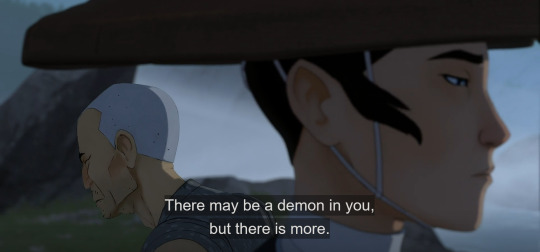
And Akemi, on the other hand, is not some girly, sweet, vain and spoiled princess as Mizu might believe. Instead she has never cared for frivolous things like fashion, love or looks, instead favouring poetry and strategy games instead, and has always only cared about her own independence. Seki, her father figure who knows her best, knows this.
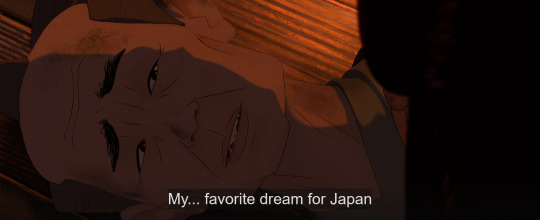

But neither is she some authoritative dominatrix, though this is part of her new persona that she is trying to project to get what she wants. Because while Akemi is willful, outspoken, intelligent and authoritative, she can still be naive! She is still often unsure and needs to have her hand held through things, as she is still learning and growing into her full potential. Her new parental/guardian figure, Madame Kaji, knows this as well.
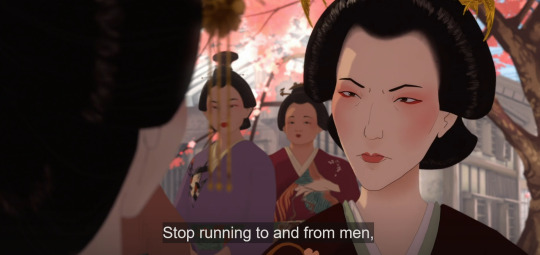
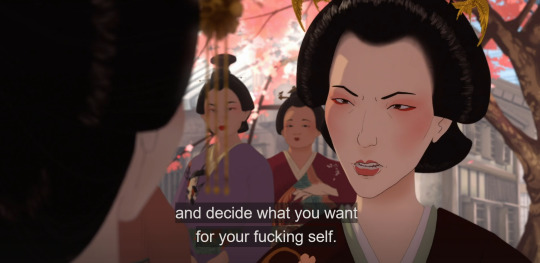
So with all that being said, now that we know that Mizu and Akemi are essentially wearing masks and putting up fronts throughout the show, what would a representation of Mizu's and Akemi's true selves actually look like? Easy. It's in their hair.
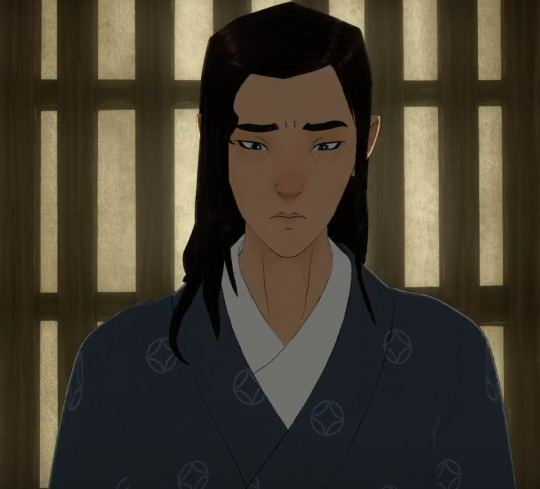

This shot on the left is the only time we see Mizu with her hair completely down. In this scene, she's being berated by Mama, and her guard is completely down, she has no weapon, and is no longer wearing any mask, as this is after she showed Mikio "all of herself" and tried to take off the mask of a subservient housewife. Thus, here, she is sad, vulnerable, and feeling small (emphasised further by the framing of the scene). This is a perfect encapsulation of what Mizu is on the inside, underneath all the layers of revenge-obsession and the walls she's put around herself.
In contrast, the only time we Akemi with her hair fully down, she is completely alone in the bath, and this scene takes place after being scorned by her father and left weeping at his feet. But despite all that, Akemi is headstrong, determined, taking the reigns of her life as she makes the choice to run away, but even that choice is reflective of her youthful naivety. She even gets scolded by Seki shortly after this in the next scene, because though she wants to be independent, she still hasn't completely learned to be. Not yet. Regardless, her decisiveness and moment of self-empowerment is emphasised by the framing of the scene, where her face takes up the majority of the shot, and she stares seriously into the middle distance.
To conclude, I wish popular fanon would stop mischaracterising these two, and flattening them into tropes and stereotypes (ie. masculine badass swordsman Mizu and feminine alluring queen but also girly swooning damsel Akemi), all of which just seems... reductive. It also irks me when Akemi is merely upheld as a love interest and romantic device for Mizu and nothing more, when she is literally Mizu's narrative foil (takes far more narrative precedence over romantic interest) and the deuteragonist of this show. She is her own person. That is literally the theme of her entire character and arc.
#blue eye samurai#mizu blue eye samurai#akemi blue eye samurai#blue eye samurai meta#just in case... im gonna tag this as#mizukemicritical#akemizucritical#though this post isnt actually criticising the ship itself but rather fanon's portrayal of the ship and the characters#for that reason lemme also tag this as#wank.mp3#feel free to disagree of course but please be civil#and if you need to rant about how wrong i am without any convincing evidence kindly feel free to make your own post. peace and love <3#fandom.rtf#meta dissertations.pdf#shut up haydar#edit: for full disclosure. i do rather dislike this ship. but obviously it's fine for anyone to enjoy it. please do! have your fun!#it's just that as usual! popular fanon and fandom around a ship is what has completely deterred me from any sense of enjoyment of it#it's a shame too because i was very open and even eager for some mizu/akemi romance in the future#but out-of-character fanon + the rudeness of certain fans has definitely soured it for me#but that doesn't mean people can't enjoy it obviously! ship and let ship!!!#plus it has its appeal which i DO STILL see and enjoy!!!!#i would even go as far as to call them soulmates because their narratives and characters are LITERALLY intertwined!!!#but. yeah. my gradual distaste for this ship is indeed very unfortunate.
802 notes
·
View notes
Text
I actually think Dorian and Orym should fight more.
Remember when their slowly building tension over and entire episode (full of passive aggressive remarks and blame throwing) led to threats? And how after, Orym thanked Dorian for handing over the crown sadly because he knew Dorian would be mad at him? And Dorian couldn't even look at him because he was legitimately hurt, thinking Orym was disappointed in him for doing what he thought was right? That was peak.
The fact they went from that to their current closeness and trust is the best part of their entire dynamic. Their relationship was hard fought and still will be. They will fight for it because they respect and care for one another deeply, and their disagreements don't change that, only improve it.
#critical role#cr3#orym#dorian#dorym#text post#cr discourse#'dorian deserved that actually and is being stupid by agreeing with ludinus'#'orym was too mean and needs to be quiet about his trauma'#just say you don't understand their characters#or that they are characters#you don't have to agree with them. they can make decisions you wouldn't make and disagree with#its good tv regardless#dorian didnt deserve that and orym was too harsh#dorian needed to be reminded of the consequences of indulging those ideas and viewpoints and orym is tired of this discussion happening#these things can coexist#neither of them have the whole picture here. we can't judge them based off of what we as viewers know#dorian didn't see first hand what the ruby vanguard has done. only what the spider queen did so thats on his mind more than anything#orym didnt see first hand (nor hear many details) about opal and cyrus. only what the vanguard has been doing to them for months#let them bicker and argue#its the best part#only going near the discourse because i have been waiting years for more of this and bitches on twitter are complaining about it#and often from people who don't even like orym (or sometimes dorian). go back to ignoring them and let me enjoy this moment in peace#i know i am adding to the discourse but i needed to find other people who want more dorym relationship drama before we get more fluff
315 notes
·
View notes
Text
The fandom's bias and tendency to wanting to agressively associate EVERYTHING with Percy and getting upset when a character isn't associated with him really taints their view on actually significant relationships, and it ruins Percy's canon character tbh.
I came across a video edit appreciating Jason and Nico's friendship, and the comments were just filled with people raging on how Percy should've been included instead of Jason because he was "much closer friends" to Nico than Jason was. It's appalling how much ppl can turn to a blind eye when it comes to Jason.
People hate Jason SO much in this fandom that they literally refuse to admit that Nico canonically considered Jason as his first ever friend, not Percy (this is literally said in Tower of Nero, by the way)
You guys are seriously so hell bent on wanting to take away every little thing jason had that makes his character meaningful, simple to give it to percy when it isn't even necessary. Doesn't percy have enough good characterization already? Why deprive Nico of a genuinely good friendship? Jason spent time and effort to make Nico comfortable and succeeded in earning nicos trust. He taught nico to never push people away and not to be ashamed of being himself, Isn't that beautiful? Why do people get salty abt that so much? Because of course, it's about appreciating Jason for once, and not Percy, isn't that it?
My perspective on Percy and Nico is that, they were never really "close" to begin with and never ended up being close either, and that's okay. Percy tried his very best to be a brother to Nico, but they somehow always had tension with eachother because of Nico's internal turmoil of idolizing and crushing on Percy whilst simultaneously associating him with Bianca.
Sure, they talked it out a little in the end, but I'd like to think that some tension would always be there, because they started off at the wrong foot, and there was too much bitterness and resentment to come in their dynamic. And them never actually being close "brothers" makes their dynamic very significant and authentic. In the end, Nico acknowledged that Percy was a good person, and I like to think that's the farthest they've ever gone in their dynamic. They both are on amicable terms but the awkwardness still being there is very realistic, the weight of Bianca's death would always be associated with Percy to Nico, and it's neither of their faults. That adds SO much to their angsty dynamic, why get so upset about it when it's such an integral, and meaningful part of the story? Nico and Percy not being close friends shows how complex character relationships can be.
Percy doesn't have to be close with everyone just because he's the main character, it really deprives him of actually meaningful connections. The fandom forcing him to be buddy buddy with everyone simply because they HAVE to associate Percy with anyone and everyone, and getting angry that Jason is closer to Nico than Percy is, is just really weird.
Why do people feel SO threatened about Jason all the time that they have to get all defensive and suppress his connections by dragging Percy into videos that doesn't even have to do anything with him? I swear y'all are creating this whole Jason/Percy rivalry thing because you cannot bear to see someone rival Percy, and you want Percy to be the only powerful/good person in the books.
Let other characters befriend eachother without trying to insert Percy in there all the time.
Percy and Nico would never be like Reyna and Nico, or Jason and Nico, and that's completely fine. I like them better that way. You can't be best friends with everyone. That's just how life works.
#I hope people don't come at me for this#Some parts of the Percy fanbase can be scarily defensive and aggressive so I won't be surprised if I get mean comments abt this lol#but I said what I said idc. Jason is canonically Nico's closest friend. You hating jason isn't going to change the fact that it's canon.#There's literally nothing wrong with Percy not being best friends with Nico why do ppl act like it's a bad thing.#You can agree or disagree with me but pls be respectful#pjo#pjo fandom#percy jackson#jason grace#pjo hoo#pjo series#pjo hoo toa#annabeth chase#piper mclean#leo valdez#frank zhang#hazel levesque#nico di angelo#reyna avila ramirez arellano#reyna ramirez arellano#heroes of olympus
834 notes
·
View notes
Text
A bit tired of people complaining about Sanji's principle of "not hitting women" being misogynistic when it has been clearly stated multiple times that he does not choose it and it's heavily tied to his trauma and admiration for his dad and respect for women and definitely not from seeing women as somehow weaker than him
#like okay i get where you're coming from and i understand that from a simpler perspective it's weird#if meet a guy irl who refuses to fight against women no matter how evil they are for no reason other than being women i'd consider it odd#but.... we have watched sanji's backstory and we have seen him actively feeling bad for not being able to hit female enemies#like what do you not understand#you can say the practice itself is based on misogynistic views too but the reasons why sanji doesn't hit women are more complex than that#a lot of people might disagree with me but like#i'm not saying the act itself is awesome and solemn and correct but you can't go and call sanji a misogynistic character just bc of that#like saying he views women as weaker than him is just. wrong. and i've seen people say it#and yes this behavior adds to his gentleman personality and it's also for the writing to show how polite and nice he is to women#but it's not exaggerated. he genuinely has issues viewing women as equals bc he romanticizes them#and that's bad! he knows that's bad!#let the character grow?????? i swear people can't read 😭#i'm not making any sense i just woke up but yeah#one piece#black leg sanji
271 notes
·
View notes
Text

#da:tv#dragon age the veilguard#veilguard summer#varric tethras#solas x varric#buddy what are you doing#didn’t you disagree in inquisition
255 notes
·
View notes
Text
Thinking about Mass Effect, as you do, and how I'm kind of sad that the way it's been engraved in pop culture has more to do with the way internet reacted to it at the time than what the actual game is about. Yes sure, it's about romance (and not that much all things considered) and it's pulpy (but not solely because of hot lady aliens), but it's also intricate worldbuilding that touches on a lot of sharp ideas, and a complicated tug-of-war between a genuine and vulnerable belief in reconciliation and community VS post 9-11 US military propaganda and steadfast belief in heroic exceptionalism, and the melancholic yet energizing mood, and the daring narrative systems, and so so much more than the 'We'll Bang OKs" and the "There's No Shepard Without Vakarian" and the whole ME3 ending situation
It's all there, but I'm sad the impact of the series is often reduced to (what I think is) the least interesting parts of its sum
#mass effect#mass effect meta#and what I'm the MOST sad about#is how bioware internalized a lot of that I think#I think Mass Effect 3 and especially the Citadel DLC suffered from trying to pull itself in the shape of what the fandom expected#it's why I'm so ambivalent about Mordin's seashell bit --which I do find kinda cheap in its attempt at being an obvious crowdpleaser#and it's why a lot of the Citadel DLC jokes don't land as well as they could have for me#AND why I didn't react that well to Andromeda either#which to me forgot a lot of its strong worldbuilding foundations and sincerity#and ended up feeling so very... “liberal” to me --if you can forgive my semi-judgmental wording#as in: gestures at inclusion and would do pronoun rounds probably but will never lift a finger to criticize actual systems of power#it's “nicer” and people are more fun but the colonialist project is never sincerely questioned by the narrative#elon musk-like “genuises” are given a god-like aura#species become mostly tired and watered-down versions of their archetypes...#I don't know. I'm sure a lot of people will disagree but yeah I was thinking about this today
235 notes
·
View notes
Text
"if we make america worse and more of a dictatorship that will be even harder to unravel and make it the way we want the country to be, maybe then everyone will join our Glorious Revolution!" bb girl you cant even be in the same room with someone who thinks you should vote, how in tf do you think you're gonna unite people to fight in The Revolution with you? it's gonna be you and your 5 friends, i hate to break it to you.
#i dont think you realize how repelling you and your politics are to everyone else#you get all of your validation for how Smart You Are from your friends and ignore any kind of feedback that suggests you should#change or do something differently. thats the only reason you're so convinced average people will go along with you bc you keep getting#affirmation from the people who ALREADY agree with you- but you have NO IDEA how to bridge the gap between people who agree#with you and disagree with you. you're horrible at convincing people of your side of things outside of straight up guilt tripping them#or bullying them like a highschooler. im sorry but the tools you learned to survive with as a kid aren't gonna help you in this situation.#the ONLY THING you can come up with to bridge that gap is a bloody revolution. thats how bad you are at this.#and you're also so bad at this and unimaginative that you dont even realize how THAT might not even be enough.#you cant imagine ANY kind of avenue to getting people to change AT ALL outside of blood and fire. and thats why people call you#an authoritarian.#i'll be honest- i really do think the world would be a better place if we did incremental change under a democratic president who wont#set the world on fire vs the godkingemperor republican WHO WONT EVEN LISTEN TO YOU AT ALL EVER AND MIGHT KILL YOU#FOR PUTTING UP A STINK. idk if you noticed but if that evil fuck gets into office we are severely outnumbered if he gets police#n shit to go after his own citizens. letting trump win is making this battle so much harder than it needs to be.#you are choosing trying to fix the world while its exploding vs trying to fix it before it explodes at all.#what is this like a procrastination thing? you wanna wait till the last minute to try? idfgi. wtf is wrong with you#throwing minority lives away to prove a point. and then you try to tell me you care. gtfoh.#accelerationists should never be taken seriously.
447 notes
·
View notes
Text
CLASSES - a comprehensive guide
The first thing that needs to be said is that there is no such thing as a "bad" class. All of them have the potential to be a great detriment OR great boon to the rest of the team, depending on how far along the journey of self-actualization a party member is. Some may have steeper challenges, but this corresponds with greater rewards.
The second thing that needs to be said is that all players are part of a team, and all personal journeys and playstyles are interlinked. No class is truly "solo." Even the smallest viable session is still two people, and even the most suitable classes for solo play are stronger when they're in a party.
The last thing that needs to be said is that the game wants you to succeed. The game, inherently, wants every player to reach godhood, wants every player to self-actualize, wants every player to win. It respects free will and free choice, so it will allow for failures (and, indeed, doomed timelines are vital to the alpha one existing), but Skaia is ultimately optimistic, and tries at every turn to ensure that a golden ending is possible.
Because, after all, SBURB/SGRUB - and Homestuck itself - are about children growing up, maturing, and learning compassion for each other. About fixing their flaws and rejecting the negative aspects of the society they came from. It's about how it is our duty, our responsibility, to become kind, mature people who care about one another, because we will one day be responsible for creating a new society.
And so, without further ado:
ACTIVE (-) Classes and PASSIVE (+) Classes are described with the dichotomy of "powers working for the self" vs. "powers working for others," but I believe this to be an oversimplification of what the active and passive split is. Both active AND passive classes benefit from being in a party; however, an active class will gain fewer party benefits in exchange for being more suited for solo play, while a passive class will be less suited for solo play, but confer much greater benefits to party play.
This is reflected in their personal quests: while active classes and passive classes will both require intervention, empathy, and guidance from their teammates, the struggle of an active class is usually one of grappling with internal flaws, and the struggle of a passive class is one of grappling with interpersonal or societal relations. In other words, the personal quest of an active player will usually involve getting therapized, while the personal quest of a passive player will usually involve addressing a systemic societal issue. Often, both will be required, but whether a class is active or passive will indicate an area of focus.
KNIGHT - / MAID +
PARTY MANAGEMENT
one who wields [aspect] or leads with [aspect] / one who distributes [aspect] or manages with [aspect]
KNIGHTS (-) are a very flexible and versatile class; "wielding" their aspect does not necessarily mean they are skilled at DPS. It actually indicates the way a knight interacts with their aspect, a very straightforward relationship of tradesperson and tool, or soldier and weapon. Similarly, while a knight does not always take up the "leader" position in the party, they will be the "spearhead," a point behind which the other players rally, a beating heart keeping the party together.
This straightforward relationship between a knight and their aspect leads to knights finding little difficulty mastering their aspect once they've begun. Many knights are, in fact, instinctively drawn toward utilizing their aspect, in the same way that they are naturally drawn toward roles of importance or heroism.
Knights often struggle with their perceived place in society, as well as with their innate sense of self and self-worth, seeing themselves as outcasts, resenting the responsibility placed on their shoulders, and fearing vulnerability. Unaddressed, these issues will lead to knights who actively become a detriment to party success. For example, they can dismiss valid concerns, shirk their duties, and in the worst case scenario, actively lead the party down the wrong path, invoking their natural ability to lead for ill.
Therefore, a knight's journey is one of accepting themselves and accepting their duty to better the world. It is about coming to terms with their own insecurities and learning to rely on others. It is about learning to take responsibility, and accepting the banner of a just and glorious cause.
A fully realized knight will be the center of every charge, the guiding star behind which the other players rally. They can provide clarity and guidance to those still on their journeys, and peace and comfort to those who are struggling or in pain. Where the knight goes, the party will follow, as a unified and united front.
MAIDS (+), meanwhile, tend to be on the backlines. If the knight is the forward march, then the maid is the supply line, an incredibly vital role whose absence is disastrous, even if its presence is nearly invisible. Maids have a nearly infinite well of their aspect to distribute, and are uniquely talented at managerial duties - keeping players on task, patching up the holes in a plan, sourcing and supplying resources, so on and so forth.
This is not to say that maids are relegated to support roles - a maid is usually capable of holding their own in combat just fine, especially if they've been endowed with a more combat-suited aspect. Both knights and maids are extremely versatile. That being said, maids truly shine when they're able to take on these backline roles, and many maids are more noticeable by the devastating effects of their absence rather than the invisible touch of their presence.
However, they are the class that most often starts in subservient conditions - low status, strict duties enforced upon them, so on - and their personal journey is a constant struggle against the control of others. Maids whose parties fail to grapple with and undo these shackling forces will find their maids succumbing to the influence or control of malicious entities; in the worst-case scenario, a maid can become an actively hostile enemy or saboteur, invisibly pulling the party's strings and setting them up for failure.
Therefore, a maid's journey is about rejecting societal oppression and throwing off the chains that bind them. A successful maid rises to become the head of the household - nothing occurs within the game that does not first pass the maid's inspection, and their touch ensures that there is a place for everything, and everything is in its place.
A free maid, who belongs to themselves, incomparably increases a party's efficiency. Every communication line is clear, every distribution route is clean, every mystery is solvable, and every plan is airtight. A maid guarantees that nothing can ever go too wrong.
PAGE - / HEIR +
TEAM BONDING
one who must earn [aspect] or inherits the mantle of [aspect] / one who is beloved by [aspect] or awakens to [aspect]
PAGES (-) start the game with the fewest benefits from their aspects, but the greatest potential for growth. Theirs is a constant battle with the self; they are often cowardly and naive. They possess sensitive souls, and while it is incredibly easy to hurt a page, it's much more difficult to build them up. Because of the difficulty of raising this class, it's practically defined by its journey - a constant struggle against the self - rather than its destination, and the powers the class confers.
Pages, like heirs, are classes of inheritance. A page is promoted by trials and tribulations and comes to inherit a greater power than they begin with; in the same way, the class will one day come to embody its aspect, although the road will always be turbulent and long. Moreover, it is a journey without end; pages, being as sensitive as they are, are the most prone to backwards progress, even after reaching their peak.
They prone to staying weak throughout the entire game, never self-actualizing past being the party joke. They attract the obsession and ridicule of stronger-willed players, and their mistreatment can become extremely divisive. A page can easily become a party's albatross, the epicenter of massive interpersonal conflicts, which can tank an entire session.
Therefore, a page's journey is one of the most difficult of all - that of teaching others how to care about other people. Pages rely on great patience, kindness, and understanding. Their sensitive souls must be carefully nurtured and propagated with love and attention. In the same way that a page can tear a team apart, they can bring a team together, all in the name of compassion and empathy. A fully-realized page is the symbol of a party that has linked hands with one another.
Self-actualized pages, as a result of the difficulty inherent to the class, are incredibly powerful and versatile when fully realized. Inheriting the mantle of their aspect, they become pure embodiments of their aspect, capable of achieving impossible feats of raw, unfiltered power, and inspiring all those who gaze upon them.
HEIRS (+) begin the game very strong, but have a difficult time becoming stronger. This is because their usage of their aspect is very instinctual to them, even at times being entirely beyond their control, hence, "beloved by" in the class description. However, because of how naturally their aspect comes to them, it makes taking further command of their powers difficult.
An heir "awakens to" their aspect because their natural, intuitive control often renders them too comfortable to grasp the greater implications of their class. As an inheritance class, heirs can come to embody their aspect, transforming entirely into it. Their challenge lies in breaking out of their comfortable shell and learning how to utilize their powers in more active, intentional ways.
This is reflected in their personal quests. They are often set to inherit great privilege or wealth prior to entering the game, and are thus naive to the realities of the suffering and pain of others. Without a supportive party willing to challenge their views, heirs can perpetuate that pain by submitting to their place in the world, becoming a divisive force within the party, or, in the worst case, losing themselves to their inheritance, and submitting so wholly to their aspect that they become lost to the rest of the team.
Thus, an heir's journey is to question the stratification of the society they belong to, so that they can recognize and address its flaws. They must learn to interrogate their inheritance, separate it from themselves, and reconcile with it. Theirs is an arc of examination and understanding, descending from their position of privilege and peace to learn about the suffering of others, and deciding that they wish to do something about it.
With full command over their aspect, and a clear vision for how it ought to be distributed, the party gains a new and powerful ally - the aspect itself, which will come to embrace the entire party as family. A fully-realized heir connects the privileged and underprivileged, spreading their inheritance to all.
MAGE - / SEER +
GUIDANCE
one who invokes [aspect] or is drawn to [aspect] / one who comprehends [aspect] or is guided by [aspect]
MAGES (-) are a class of prophets, although saying they "see the future" is misleading. Rather, mages "invoke" the future, collapsing causality to align to their desires. Most mages remain unaware that they are doing so until well into their journey. While all players weigh on the scale of causality, affecting both past and future events, and which sequence of events is the "alpha" sequence, mages have the most direct effect.
Because of this ability to invoke future events, mages possess powerful buffing/debuffing abilities. Furthermore, as one of the two knowledge classes, a mage usually has a very deep understanding of their aspect, and an intuitive knowledge of how the flow of time and causality function. They are "drawn to" their aspects in this way, instinctively searching out points where their influence can affect the flow of events.
However, with great power comes great cost; the mage class is usually assigned to those who are stricken by tragedies and prone to negativity and self-loathing. Mages often begin the game as a detriment to the party, "prophesying" future events that leave the party - including themselves - at a disadvantage. In the worst case scenario, a mage can invoke certain doom for their party or themselves.
Therefore, it is vital that a mage address their tragedies and be given a chance to heal and grow. The ones most struck by tragedy, theirs is a journey of reclaiming lost joy and rediscovering lost hope. However, the transformation is powerful once completed - as the one who suffers tragedy and loss most intimately, a mage can also come to be one of the most empathetic and compassionate members of the team.
If a mage is uplifted, and capable of believing in a kinder and gentler world, then their ability to invoke the future - and the aspects of their aspect that they are drawn to - become kinder, as well. Pain and suffering still have their place, but the ending will be a happy one. With a fully empowered mage, the future will always be better than what came before.
SEERS (+) see multiple branching paths. A mage determines where a road will be built, but a seer tells you where a road CAN be built. They are also often gifted with knowledge of the game and its mechanics, and are especially uniquely gifted with understanding of their own abilities. In this way, they "comprehend" their aspect.
Seers themselves are not particularly gifted in combat through their classpect alone; however, in exchange, they often play a vital role in steering the party. They are the game's built-in guides, with an intuitive knowledge of the game's victory conditions, as well as an instinctive desire to lead others along their paths. Seers are, therefore, one of the most important classes in the game, when one is present.
However, the ability to see is a burden as well as a gift. Seers find themselves paralyzed by choice, and often doubt their own abilities to choose "correctly." They are prone to becoming mired in what-ifs, and struggle with political or ethical debates with no clear answers. In the worst-case scenario, a seer may feel so cursed by their sight that they self-destruct, and deliberately choose poor or incomprehensible answers, in an attempt to free themselves of their sight.
Thus, a seer's quest is, ironically, to see the world beyond the purview of their aspect. They must come to have a more comprehensive understanding of the world they live in, and what purpose they are trying to achieve, so that they can feel confident in the choices they make. A seer is often blind - their journey, therefore, is that of regaining their vision, by connecting with the world outside their inner sight.
A seer with a clear vision for the future will always know exactly which path to choose. A party with such a seer in it will never be stuck and never be lost. If there exists a path to self-actualization, the seer will know it. And if there exists a path to a breathless and perfect victory, a fully-realized seer will light the way.
THIEF - / ROGUE +
UTILITY
one who steals [aspect] from others or steals with [aspect] / one who steals [aspect] for others or steals from [aspect]
THIEVES (-) are a very difficult class to play. They start out with almost no passive abilities regarding their aspect, and their ability to actively use their aspect is contingent on their ability to first "steal" it from someone else. Thus, they are always playing a game of resource management, and there is always a chance for them to be left helpless after a heist gone wrong.
However, their gimmicky nature allows them to overtake other classes even in that class's specialty, if they can set up the exact right circumstances and manage their resources well. This makes them incredibly versatile, especially when a thief is working together with a party, and thus able to count their party among their potential resources. It takes great cunning to play the thief class well.
However, this also makes the thief a potentially dangerous element to the rest of the party. Thieves are often egotistical and self-serving, willing to see enemies and allies alike as resources and tools. Unaddressed, their reckless, selfish natures will earn their teammates' distrust and enmity. In the worst case scenario, a thief running rampant can severely harm the party, or earn so much ire that the party turns against them.
Thus, their journey is that of realizing that their selfishness and ego are flaws - the classic parable of "money doesn't bring happiness." Beneath their uncaring surface lurks genuine emotional distress; a thief must come to realize that their greed and selfishness is an active detriment not only to the people around them, but their own selves. Only then can they heal from their injured souls.
A thief that has undertaken this journey is one who has realized that they are stronger when they are working with others. Their versatility, creativity, and cunning are incredible assets once harnessed toward the will of the party. No situation will ever be inescapable, no safe uncrackable, and no problem unsolvable - not if the thief has anything to say about it.
ROGUES (+) are similarly difficult to play. Unlike the thieves, rogues do see passive benefits from their aspects. However, their active abilities are much less straightforward, and rogues often struggle with understanding them. A rogue's role is to redistribute wealth - thus, "stealing for the sake of others."
A rogue, being able to steal directly from their aspect, truly shines when given enough time to prepare. If a thief must fly by the seat of their pants, then a rogue is a heist planner - they have an infinite box of tools to pull from, if only they know what tools they'll need for the job. This makes them incomparably versatile, even if not necessarily in the heat of combat.
Rogues take on the mantle of challenging the status quo. They usually begin the game already in opposition to their society, seeking out better alternatives and considering unorthodox options. However, not every party is ready for a rogue's radical ideology, and not every rogue has considered the full consequences of their belief in change; in the worst case scenario, the rogue can become outcasted and disregarded, or cause an upheaval that proves disastrous, rioting for the sake of rioting.
It often requires the help of others for a rogue to understand how to use their powers. In the same way, it requires the party's honest communication and exchange of ideas to help a rogue grasp exactly what form their rebellion ought to take. A rogue knows instinctively that something must change; their journey is learning how they ought to go about it.
Once they do, a rogue - given enough time to prepare and plan - is the ultimate utility player, having the right tool for every possible situation. Their abilities are only magnified in a party setting, as their teammates become variables that unlock new possibilities. A party with a fully-prepped rogue always has a perfect plan, a way to solve any problem that they might face.
WITCH - / SYLPH +
AREA CONTROL
one who manipulates [aspect] or achieves dominion through [aspect] / one who nurtures [aspect] or creates a land of [aspect]
WITCHES (-) carry with them the winds of change. A witch manipulates, changing properties of their aspect and their aspect's effect on others, creating a "territory" over which they rule. They see few passive benefits of their aspects, in exchange for their active abilities being so all-encompassing and overwhelming.
Once their territory has been established, witches make the rules. Their changes can be permanent, temporary, massive, and miniscule. However, a witch "achieves dominion" with their aspect - this means that they must first struggle to create this domain, and it's difficult for their abilities to manifest until they do, often leaving younger witches weak and vulnerable.
Witches have strong feelings for how things should and should not be, but not necessarily grounded ideas for how to implement them, often due to some "outsider" status in society. Unfocused witches become dangerous for the party, as they are easily manipulated; in the worst-case scenario, they can fall in with malicious forces, who can sway a witch's turbulent heart and utilize them as a force for negative change, rather than good.
Thus, a witch's journey is that of interrogating right and wrong. A witch must struggle with morality and ethics, and come to clarify their own beliefs; only then can they know what sort of domain they wish to establish, and what sort of rules they wish to enforce. Once they know their own hearts, they can shake off the insidious whispers of malicious external influence.
As if a reward for their struggles for autonomy and independence, the witch is the one whose will is most imposed on the world that comes after them. Just as an evil witch putrefies the world around them, a fully-realized witch who has decided to use their influence for good can create a near-utopia.
SYLPHS (+) call to mind the images of fey folk who sprout plants where they walk. That is how a sylph "creates a land" of their aspect - merely by existing, the world around them becomes suffused by it. A sylph's mere presence nurtures, grows, and heals their aspect; unlike witches, who manipulate what is already there, sylphs can create something from nothing.
The establishment of their domain comes naturally to them. Those caught within it are on the receiving end of their aspect, whether they want to be or not. In exchange for such powerful passive abilities, a sylph's active abilities are weaker, and usually unsuited for solo combat, generally being of healing, buffing, or debuffing nature.
A sylph is prone to selfishness - to luxuriating within their own land, their own aspect, their own mind. They often have difficulty connecting with others and understanding why their own personal world may not be to the liking of the world outside of themselves. Often, they are aloof. An unrealized sylph can cause great harm to the world around them, their domain choking out and smothering their party; in the worst case, they can mire their party within it, leaving their party unable to proceed.
Thus, it often requires the outside world to breach their safe haven in order for a sylph to grow. They must be made uncomfortable, and then made to accept that uncomfortable things are also important - maybe even more important than comfort, at times. Growth often requires pruning; a sylph's journey is to come to understand that good intentions may lead to harm, and, vice versa, that harm can often lead to true growth.
Sylphs can provide the greatest compassion and emotional comfort within a party, encouraging - if not enabling - their teammates' growth in their personal journeys. Once a sylph understands when it is appropriate to encourage, and when it is appropriate to pull back, there is no refuge safer for the party than the sylph's domain.
PRINCE - / BARD +
OBSTACLE REMOVAL
one who destroys [aspect] or destroys with [aspect] / one who allows the destruction of [aspect] or allows destruction through [aspect]
PRINCES (-) possess the ability to annihilate, a destructive class not limited to physical or tangible objects. Princes also enjoy auxiliary benefits as befits their royal titles - many princes start the game with great talents, great status and wealth, or both. They are also endowed with royal presence; their very existence provokes strong emotions from those around them, for good or for ill.
One of the more straightforward classes in the game, a prince's ability to destroy most commonly manifests as DPS. However, their abilities encompass a greater scope than mere damage - the prince's ability to annihilate figurative or metaphysical concepts makes them capable of directly removing any obstacles that stand in their way. As if hungry to consume their aspect, they are naturally drawn towards where it congregates.
However, with great power comes great responsibility: princes are often the most psychologically maligned within the party, and their destructive talents can very easily become self-destructive instead. Usually the result of societal pressure, trauma, and suffering, a prince is prone to embodying the lack of their aspect, rather than its presence. In the worst-case scenario, a prince spreads this misfortune to the rest of their party, destroying the presence of their aspect from their session altogether, often taking themselves along with it.
A prince must be shown compassion. Though they are often viscerally unpleasant to engage with, turning a blind eye to foolishness, loneliness, and suffering - which a prince embodies - is one of the worst things that a party can do. Though the effort at times seems undeserved, to heal a prince requires a staunch belief that there is good to be gained if we are kind to each other. This kindness will be returned; once you are counted among a prince's "people," they will do anything to keep harm from befalling you.
A prince, once shown this grace, is incomparably powerful. To destroy their aspect or with their aspect is the ability to destroy nearly anything, including concepts such as despair, death, and doom. As if proclaiming a royal decree, a fully-realized prince can banish misfortune and ill tidings altogether, leaving nothing standing in the party's way.
BARDS (+) are a wildcard of a class, often responsible for a party's improbable victory, abject defeat, or both. Their abilities are not very well-understood, even by the bard themselves, and they often utilize both passive and active abilities intuitively, unaware that they are doing so. The morale of the party is deeply tied to the bard's own, and it's unclear which side is cause and which is effect.
The ability to allow the destruction of their aspect, or invite it through their aspect, is actually something of a debuff rather than DPS - the bard's ability is to break unbreakable shields, tear down unclimbable walls, and nullify unstoppable forces. Rather than dealing damage themselves, they allow for damage to be dealt that would otherwise have no effect - in other words, by nature, they make the impossible possible. This is the true source of their ability to evoke "miraculous" situations.
Bards are inextricably tied to society - after all, their tales only hold as much value as their relevance to the audience. This means those with the bard class are invariably molded by the worst aspects of the society they come from. They serve as living embodiments of the most unpleasant aspects of society, and living reminders that leaving these elements to fester only means they will multiply in severity. If these beliefs are allowed to go unexamined, bards will always steer a party towards ruin.
Therefore, a party must engage with the bard earnestly, compassionately, and openly, and help them see the errors of the past. A bard must be led, with gentle guidance and genuine openness, to discard their harmful beliefs, and sing a new, more beautiful tune.
A bard that has been brought back into the fold is a worker of miracles. When every other possible option has been exhausted - the knight and maid in disarray, the page and heir unable to keep the party together, the mage and seer blinded, the thief and rogue out of action, the witch and sylph with their territory lost, the prince no longer able to function - this is where a bard will step in, transmuting abject defeat into a perfect and breathless victory.
#homestuck#classpect#classpects#just my own opinions obviously#feel free to disagree#this is also more meant to examine the actual text of homestuck or serve as a reference for fanworks#i dont actually vibe that much with classpecting actual real people#because unlike fictional characters we contain multitudes#still i cant STOP you if thats what you want to do hahahah
485 notes
·
View notes
Text
Okay so I'm not generally a sports person but I can't stop thinking about all the ways the foxes revolutionized exy. For example, the way their tiny team structure made them focus on endurance and coordination rather than brute force? Amazing. And related to that, the way that they adapted by training players to fill multiple positions? That must have had huge implications for how they understood other players needs and allowed for flexibility of they needed someone's specialty in a different position (see the final game). BUT ALSO the way Kevin and Neil specifically shook up the game was insane. Kevin being ambidextrous and using it to make his moves unpredictable. Using heavyweight racquets to put more strength behind their shots. Communicating only in French so opponents don't get any warning but they're still in sync with each other. I'll bet you anything other teams were scrambling to catch up and figure out how to play like the foxes did
#the foxes winning season would have had insane implications for the way exy is played i can feel it in my soul#other teams would've been scrambling to catch up and copy what they were doing but no one can do it like them#the ravens had their time ruling exy but i think the foxess' unpredictability and determination kicked their playing style in the mud#insane about this if you couldn't tell#aftg#neil josten#all for the game#kevin day#the foxhole court#the kings men#the raven king#NOT TO MENTION ANDREW#but during the series what he does is more raw talent than innovative play style#if you disagree and can think of something specific he did please feel free to add on though
598 notes
·
View notes
Text
Do y’all have ships that you indirectly ship? Like, you know nothing about them, doesn’t search or read fanfic but that one person you follow is always posting about them and you’re like: “yeah girl, they make absolute sense, an obvious OTP”.
#fandom#ship dynamics#because honestly#I have many in my timeline#know nothing about them#am not interested in consuming the show/book/movie or reading fanfic#but if someone shipped those two with someone else I would heavily disagree#because what do you mean? those two are OTP and not meant to be with anybody else!#just me?#well then 🤷🏼♀️
3K notes
·
View notes
Text
what's weird about the fantasy high drama is that like. it seems to me like people forget d&d is primarily a) a game you play with your friends and also b) luck based.
I mean it's fine to say that "nothing felt like a challenge" and "they just dominated everything and there weren't any stakes" but like. it's not as if they weren't up against huge threats. they lost the mall fight. the last stand was an onslaught of enemies. they fought a dozen dragons from an airship. the fights were hard. they're just really good. they've had very good dice luck in general this season and are all very high level and highly specialized. fig is gonna beat deception and performance checks. adaine's gonna figure out the arcana. riz is gonna succeed investigations. like. for some reason their strategical competence and wisely picked abilities are. a downside? a disappointment?
the thing about d&d that you need to remember is it's first and foremost a game. it's mostly random and it takes you down weird paths and you're playing to have fun with your friends. the dice are literally telling the story that it's their time, it's their year. they've struggled enough. they've trained enough. they're good at what they do. and in my post about the academic/domestic/personal stressors being the focus, d&d doesn't have any other system to work them out than rolling different skills. that's what d&d is. brennan set specific challenge levels for different tasks and the players strategized to prioritize which abilities they were strongest in. the challenges were there. and the players rose to them. they were both smart in their delegation of responsibilities and lucky with their dice rolls. of which, both are foundations of d&d.
don't mistake them being good players and getting lucky with there being no hardship. just because they smashed through the wall, that doesn't mean the wall wasn't strong. they were just stronger.
#i know some people are disappointed from a storytelling perspective. but you have to understand.#what was brennan supposed to do. he threw things at them both at and above their challenge level#he created a whole system to simulate academic and person goals and stress throughout the year#he gave them plenty of chances to fail#he set DCs high.#the players just knocked it out of the park#you can't tell any story but the ones the dice want you to#if he had manufactured more danger or difficulty where there was none it would have felt cheap#and do you not remember the night yorb fight#like. the whole point of the year was that it wasn't hard. it just never stopped#they can do it they're capable they're smart. but the hustle and the stress and the fighting and the working never ends#that's why nothing 'had stakes' or 'felt challenging'#it's the slog that gets you. it's how long you're willing to keep going.#how much life can break you almost to your last breath but you get through it and you keep going anyway#but. i digress.#and i say all this with complete and total respect to other people's opinions#i feel no hate and wish no bad feelings on anyone who disagrees with this!#it's just my personal view on the whole thing#sorry if im being annoying i just have. opinions.#fantasy high#d20#dimension 20#fhjy
261 notes
·
View notes
Text
I honestly love the clothing styles of each of the turtles in this show and I love how these styles really incorporate their personalities as well.
Like, obviously Donnie has the best sense of style, yeah? Think that’s something pretty agreed upon here. Everything we see him put together is very meticulously crafted and clean. That goes with his personality because Donnie is a very meticulous person in general, and he knows what he likes very, very well, and knows how to flaunt it in turn. Him commenting on colors he enjoys or disapproving of outfits that the others see no problem with also shows how he just generally has an eye for this kind of thing. He doesn’t just know what looks good on himself, but also what looks good on others - and I think this ties into his love of gift giving too. Donnie also has a flair for making sure that his things have his “mark” on them, and his clothing is no exception. All that he wears and how he wears them screams “Donnie.”
Mikey is really fun because his styles are honestly a pendulum between super simplistic and incredibly out there. And often, you’re going to see a lot of color or patterns to both. And in my opinion I think that all reflects really well on Mikey’s character - he’s got a colorful personality but even more than that he’s incredible sure of who he himself is. Mikey’s style, I feel, is less what looks good as clothes and more what sparks joy in Mikey himself. His bright stickers he wears are a testament of that! He’s comfortable in his own skin and his style reflects this perfectly, whether he goes for a more out-there look or a more toned down one.
Now, for Leo. Okay, I think I’m actually in the minority here I feel because Leo’s style isn’t really that bad? Hear me out- if you actually look at what he wears, try taking out, like, one accessory. Suddenly, that outfit works! He even manages to put together many good outfits in the series, but his “bad” ones are the ones that tend to stand out, alas (just like how his mistakes tend to be big ones oop-) Basically, my personal look at him is not that he’s inept at styling at all, but that he has a “too much” gene. And like everyone else, this sense of style is completely like him, too. Going too far to impress when all he needed to do was slow it down some to think things through. (And funnily enough, a lot of his outfits take random aspects from his brothers too - “nothing without them” huh?)
For Raph, I feel bad for him since pretty much all of his clothes are inevitably going to be ripped, but he makes them work pretty much each time. Like Leo, Raph tends to go more sporty with his looks, but I also noticed that his stuff often goes in that in between of comfy, cool, and cute. His pajama suit in particular comes to mind in terms of “cute” as it’s more something you’d see younger children in rather than older kids, and I think it can be a subtle nod to the fact that for all Raph tries to seem older, he’s still just a kid too.
I could probably go on, but these are just all off the top of my head - I love how the boys’ personality’s come out in so many different ways.
#rottmnt#rise of the teenage mutant ninja turtles#rottmnt headcanons#rise donnie#rise leo#rise mikey#rise raph#I love fashion actually#if you’re wondering where this came from it came from me watching hours of outfit creation vids#but yeah! I honestly could probably go more into it#but I’m going off my memory for the most part rip#Leo in particular makes me sad because I disagree with like 99% of the fandom about his fashion sense LOL#I don’t think it’s bad but it’s def not close to Donnie level#Donnie is his own category#Leo though he’s not just jerseys and ripped sleeves#he wears full eye makeup as a granny and kills doing it#his pirate costume was very well put together imo#even his regular weird frog like disguise is perfectly fine when you get rid of the goggles#I ALSO don’t think Raph’s style is bad either#my boy has more difficulty with clothes since he’s limited to the stretchier stuff but like#he’s got good style!!#I’m def looking more into this all than necessary but#watch me come back to this and change it like fifty times#if you’re wondering what I mean about Leo’s outfits taking from his brothers#look at Raph’s standard disguise (the one they go out to play basketball with)#ripped sleeves and a backward cap#one of Leo’s main outfits in The Clothes Don’t Fit the Turtle?#ripped sleeves and backwards cap#incedentally these borrowed aspects actually hinder his overall look!#his outfit without them is more HIM y’know? which says a lot about allll their individual styles
231 notes
·
View notes
Text
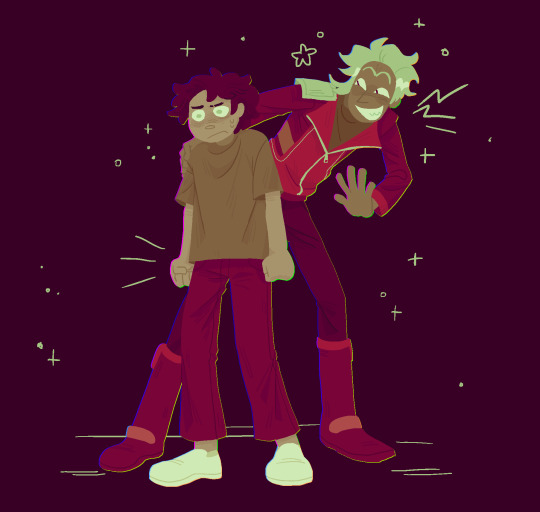
no offense but i genuinely fear that their potential dynamic will go severely underutilized
#rick and morty#morty smith#prime rick#my biggest fear continues to be 'morty gets kidnapped by prime to bait c137'#because i think it could just. be so much more neat if morty and prime actually formed some kind of relationship independently. good OR bad#like idk imagine if morty is coaxed to join primes side out of some misguided attempt to protect his family#would sure be fitting for a character that clearly values his family and their safety idk!!!#and like. god imagine what morty mighjt think of prime#like he currently only has rick's perspective of prime. and obviously whether he wants to or not he sort of Has to rely on what rick says#idk imagine morty meets prime and hes like damn this dude is pretty cool. whether its because prime is putting on a deliberate act#or morty just Genuinely Thinks he's cool#ohhhhhhh imagine this is how they bring the morty mindwipe thing back.#prime would b like 'did you know c137 left the parts of you that disagree with him in a video game? isnt that fucked up morty'#theres just so much TO DOOO and im so terrified of NONE of this happening#bcs the writers seem to be physically incapable of prioritizing anyone but rick#LIKE GOD PLEASEEEE i know they only care abt the redditor audience BUT PLEASE do something ANYTHING with morty im about to start crying#went on a little rant lol sorry. can you tell i really like morty.
788 notes
·
View notes